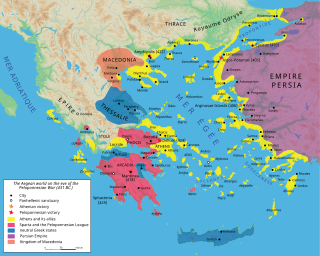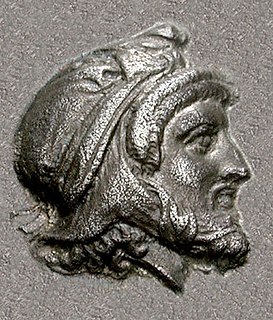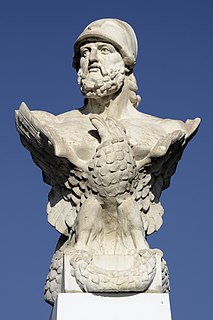See also
- Sparta, for a look at Sparta in a more geographical sense
Military history of Sparta may refer to:
Agesilaus II was king of Sparta from c. 399 to 358 BC. Generally considered the most important king in the history of Sparta, Agesilaus was the main actor during the period of Spartan hegemony that followed the Peloponnesian War. Although brave in combat, Agesilaus lacked the diplomatic skills to preserve Sparta's position, especially against the rising power of Thebes, which reduced Sparta to a secondary power after its victory at Leuctra in 371 BC.

The Peloponnesian War was an ancient Greek war fought between Athens and Sparta and their respective allies for the hegemony of the Greek world. The war remained undecided for a long time until the decisive intervention of the Persian Empire in support of Sparta. Led by Lysander, the Spartan fleet built with Persian subsidies finally defeated Athens and started a period of Spartan hegemony over Greece.

The Peloponnesian League was an alliance of ancient Greek city-states, dominated by Sparta and centred on the Peloponnese, which lasted from c.550 to 366 BC. It is known mainly for being one of the two rivals in the Peloponnesian War, against the Delian League, which was dominated by Athens.

Sparta was a prominent city-state in Laconia, in ancient Greece. In antiquity, the city-state was known as Lacedaemon, while the name Sparta referred to its main settlement on the banks of the Eurotas River in Laconia, in south-eastern Peloponnese. Around 650 BC, it rose to become the dominant military land-power in ancient Greece.

Thebes is a city in Boeotia, Central Greece. It played an important role in Greek myths, as the site of the stories of Cadmus, Oedipus, Dionysus, Heracles and others. Archaeological excavations in and around Thebes have revealed a Mycenaean settlement and clay tablets written in the Linear B script, indicating the importance of the site in the Bronze Age.

Epaminondas was a Greek general of Thebes and statesman of the 4th century BC who transformed the Ancient Greek city-state, leading it out of Spartan subjugation into a pre-eminent position in Greek politics called the Theban Hegemony. In the process, he broke Spartan military power with his victory at Leuctra and liberated the Messenian helots, a group of Peloponnesian Greeks who had been enslaved under Spartan rule for some 230 years after being defeated in the Messenian War ending in 600 BC. Epaminondas reshaped the political map of Greece, fragmented old alliances, created new ones, and supervised the construction of entire cities. He was also militarily influential and invented and implemented several major battlefield tactics.

Leonidas I was a king of the Greek city-state of Sparta, and the 17th of the Agiad line, a dynasty which claimed descent from the mythological demigod Heracles and Cadmus. Leonidas I was son of King Anaxandridas II. He succeeded his half-brother King Cleomenes I to the throne in c. 489 BC. His co-ruler was King Leotychidas. He was succeeded by his son, King Pleistarchus.

Pharnabazus II was a Persian soldier and statesman, and Satrap of Hellespontine Phrygia. He was the son of Pharnaces II of Phrygia and grandson of Pharnabazus I, and great-grandson of Artabazus I. He and his male ancestors, forming the Pharnacid dynasty, had governed the satrapy of Hellespontine Phrygia from its headquarters at Dascylium since 478 BC. He married Apama, daughter of Artaxerxes II of Persia, and their son Artabazus also became a satrap of Phrygia. According to some accounts, his granddaughter Barsine may have become Alexander the Great's concubine.

Cleomenes III was one of the two kings of Sparta from 235 to 222 BC. He was a member of the Agiad dynasty and succeeded his father, Leonidas II. He is known for his attempts to reform the Spartan state.

Pausanias was a Spartan regent and a general. In 479 BC, as a leader of the Hellenic League's combined land forces, Pausanias won a pivotal victory in the Battle of Plataea ending the Second Persian invasion of Greece. One year after the victories over the Persians and the Persians' allies, Pausanias fell under suspicion of conspiring with the Persian king, Xerxes I to betray Greeks and died in 477 BC in Sparta starved to death by fellow citizens. What is known of his life is largely according to Thucydides' History of the Peloponnesian War, Diodorus' Bibliotheca historica and a handful of other classical sources.
The ephors were elected leaders of ancient Sparta, and its colonies of Taras and Heraclea, and shared power with the two Spartan kings. The word "ephors" comes from the Ancient Greek ἐπίepi, "on" or "over", and ὁράωhoraō, "to see", i.e., "one who oversees" or "overseer". The ephors were a council of five Spartan men elected annually who swore an oath monthly on the behalf of the state. The Spartan kings, however, would swear on behalf of themselves.

Lycurgus was the quasi-legendary lawgiver of Sparta who established the military-oriented reformation of Spartan society in accordance with the Oracle of Apollo at Delphi. All his reforms promoted the three Spartan virtues: equality, military fitness, and austerity.

Athletic Club Sparta Praha, commonly known as Sparta Prague, is a football club based in Prague.
Xenelasia was the practice in ancient Doric Crete and Lacedæmonia of expelling foreigners deemed injurious to the public welfare. The isolationist customs of Sparta may also sometimes be referred to as xenelasia. The majority of ancient Greek authors attribute the codification of this practice to Lycurgus.

Cimon or Kimon was an Athenian strategos and politician.
A laconic phrase or laconism is a concise or terse statement, especially a blunt and elliptical rejoinder. It is named after Laconia, the region of Greece including the city of Sparta, whose ancient inhabitants had a reputation for verbal austerity and were famous for their often pithy remarks.

The Spartan army stood at the center of the Spartan state, citizens trained in the disciplines and honor of a warrior society. Subjected to military drills since early manhood, the Spartans became one of the most feared and formidable military forces in the Greek world, attaining legendary status in their wars against Persia. At the height of Sparta's power – between the 6th and 4th centuries BC – other Greeks commonly accepted that "one Spartan was worth several men of any other state."

Classical Greece was a period of around 200 years in Ancient Greece, marked by much of the eastern Aegean and northern regions of Greek culture gaining increased autonomy from the Persian Empire; the peak flourishing of democratic Athens; the First and Second Peloponnesian Wars; the Spartan and then Theban hegemonies; and the expansion of Macedonia under Philip II. Much of the early defining politics, artistic thought, scientific thought, theatre, literature and philosophy of Western civilization derives from this period of Greek history, which had a powerful influence on the later Roman Empire. The Classical era ended after Philip II's unification of most of the Greek world against the common enemy of the Persian Empire, which was conquered within 13 years during the wars of Alexander the Great, Philip's son.
Ariston may refer to:

The History of Sparta describes the history of the ancient Doric Greek city-state known as Sparta from its beginning in the legendary period to its incorporation into the Achaean League under the late Roman Republic, as Allied State, in 146 BC, a period of roughly 1000 years. Since the Dorians were not the first to settle the valley of the Eurotas River in the Peloponnesus of Greece, the preceding Mycenaean and Stone Age periods are described as well. Sparta went on to become a district of modern Greece. Brief mention is made of events in the post-classical periods.